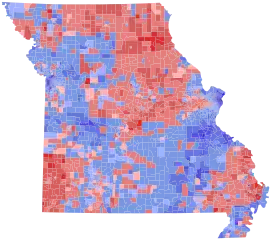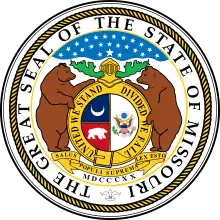| |||||||||||||||||
| |||||||||||||||||



Nixon: 40–50% 50–60% 60–70% 70–80% 80–90% >90% Hulshof: 40–50% 50–60% 60–70% 70–80% 80–90% >90% Tie: 40–50% 50% No votes | |||||||||||||||||
| |||||||||||||||||
| Elections in Missouri |
|---|
 |
The 2008 Missouri gubernatorial election was held on November 4, 2008. Incumbent Republican Governor Matt Blunt decided to retire instead of seeking reelection to a second term in office. Democratic nominee Jay Nixon won the open seat, defeating Republican nominee Kenny Hulshof.
Background
On January 22, 2008, Governor Blunt unexpectedly announced that he would not seek re-election[1] because he had already "achieved virtually everything I set out to accomplish, and more ... Because I feel we have changed what I wanted to change in the first term, there is not the same sense of mission for a second."
A November 2007 poll conducted by SurveyUSA showed Blunt with a 44% approval rating.[2] His approval among Republicans polled was 68%, and his rating among Democrats was 23%.[2] On November 10, 2007, Democrat Jay Nixon filed the necessary paperwork with the Missouri Ethics Commission to launch a 2008 campaign for governor.[3]
The gubernatorial and other statewide office primaries were held August 5, 2008.[4] CQ Politics rated the race as 'Leans Democratic'.[5]
Timeline
Primaries
Republican primary
| Party | Candidate | Votes | % | |
|---|---|---|---|---|
| Republican | Kenny Hulshof | 194,556 | 49.2 | |
| Republican | Sarah Steelman | 176,750 | 44.7 | |
| Republican | Scott Long | 18,745 | 4.7 | |
| Republican | Jen Sievers | 5,664 | 1.4 | |
| Total votes | 395,715 | 100.0 | ||
Democratic primary
| Party | Candidate | Votes | % | |
|---|---|---|---|---|
| Democratic | Jay Nixon | 303,796 | 85.0 | |
| Democratic | Daniel Carroll | 53,768 | 15.0 | |
| Total votes | 357,564 | 100.0 | ||
General election
Predictions
| Source | Ranking | As of |
|---|---|---|
| The Cook Political Report[7] | Lean D (flip) | October 16, 2008 |
| Rothenberg Political Report[8] | Likely D (flip) | November 2, 2008 |
| Sabato's Crystal Ball[9] | Lean D (flip) | November 3, 2008 |
| Real Clear Politics[10] | Likely D (flip) | November 4, 2008 |
Polling
| Source | Date | Kenny Hulshof (R) |
Jay Nixon (D) |
|---|---|---|---|
| Public Policy Polling | November 2, 2008 | 38% | 58% |
| Survey USA | November 2, 2008 | 39% | 54% |
| Survey USA | October 26, 2008 | 38% | 55% |
| Rasmussen Reports | October 14, 2008 | 38% | 57% |
| Survey USA | September 24, 2008 | 37% | 54% |
| Rasmussen Reports | September 11, 2008 | 39% | 54% |
| Public Policy Polling | August 17, 2008 | 42% | 48% |
| Survey USA | July 31, 2008 | 42% | 48% |
| Rasmussen Reports | July 7, 2008 | 38% | 49% |
| Rasmussen | June 9, 2008 | 34% | 54% |
| Survey USA | May 20, 2008 | 33% | 57% |
| Rasmussen | May 8, 2008 | 35% | 51% |
| Rasmussen | March 24, 2008 | 37% | 48% |
| Rasmussen | February 13, 2008 | 30% | 48% |
- With Steelman
| Source | Date | Sarah Steelman (R) |
Jay Nixon (D) |
|---|---|---|---|
| Survey USA | July 31, 2008 | 41% | 50% |
| Rasmussen Reports | July 7, 2008 | 37% | 46% |
| Rasmussen | June 9, 2008 | 34% | 56% |
| Survey USA | May 20, 2008 | 33% | 58% |
| Rasmussen | May 8, 2008 | 35% | 51% |
| Rasmussen | March 24, 2008 | 39% | 46% |
| Rasmussen | February 13, 2008 | 35% | 46% |
- With Blunt
| Source | Date | Matt Blunt (R) |
Jay Nixon (D) |
|---|---|---|---|
| Rasmussen Reports | December 12, 2007 | 42% | 47% |
| Research2000 | November 24, 2007 | 42% | 51% |
| Rasmussen | October 10, 2007 | 44% | 43% |
| Rasmussen | August 23, 2007 | 43% | 46% |
| SurveyUSA | July 25–27, 2007 | 38% | 57% |
Results
On election night, Nixon won easily, even though fellow Democrat Barack Obama lost in Missouri in the concurrent presidential election (albeit by only 4,000 votes). Nixon was able to perform well in rural parts of the state. When combined with heavily populated, strong Democratic areas like St. Louis and Kansas City, Hulshof didn't have a chance to come back. Nixon was declared the winner right when the polls closed in Missouri. Hulshof conceded defeat at 9:02 P.M. Central Time.
| Party | Candidate | Votes | % | ±% | |
|---|---|---|---|---|---|
| Democratic | Jay Nixon | 1,680,611 | 58.4 | +10.6 | |
| Republican | Kenny Hulshof | 1,136,364 | 39.5 | -11.3 | |
| Libertarian | Andrew Finkenstadt | 31,850 | 1.1 | +0.2 | |
| Constitution | Gregory Thompson | 28,941 | 1.0 | +0.6 | |
| Write-in | 12 | 0.0 | n/a | ||
| Total votes | 2,877,778 | 100.0 | n/a | ||
| Democratic gain from Republican | |||||
Counties that flipped from Republican to Democratic
- Caldwell (Largest city: Hamilton)
- Daviess (Largest city: Gallatin)
- Gentry (Largest city: Albany)
- Crawford (Largest city: Cuba)
- Oregon (Largest city: Thayer)
- Vernon (Largest city: Nevada)
- Lincoln (Largest city: Troy)
- St. Clair (Largest city: Appleton City)
- Livingston (Largest city: Chillicothe)
- Andrew (Largest city: Savannah)
- Atchison (Largest city: Tarkio)
- Benton (Largest city: Warsaw)
- Camden (Largest city: Osage Beach)
- Carter (Largest city: Van Buren)
- Cass (Largest city: Harrisonville)
- Dallas (Largest city: Buffalo)
- Dent (Largest city: Salem)
- Douglas (Largest city: Ava)
- Howell (Largest city: West Plains)
- Laclede (Largest city: Lebanon)
- Maries (Largest city: Belle)
- Morgan (Largest city: Versailles)
- Ozark (Largest city: Gainesville)
- Pulaski (Largest city: Fort Leonard Wood)
- Polk (Largest city: Bolivar)
- Phelps (Largest city: Rolla)
- Ripley (Largest city: Doniphan)
- Texas (Largest city: Licking)
- Wright (Largest city: Mountain Grove)
- Webster (Largest city: Marshfield)
- Audrain (Largest city: Mexico)
- Bates (Largest city: Butler)
- Chariton (Largest city: Salisbury)
- Clark (Largest city: Kahoka)
- Dunklin (Largest city: Kennett)
- Franklin (Largest city: Washington)
- Henry (Largest city: Clinton)
- Hickory (Largest city: Hermitage)
- Howard (Largest city: Fayette)
- Iron (Largest city: Ironton)
- Knox (Largest city: Edina)
- Lafayette (Largest city: Odessa)
- Lewis (Largest city: Canton)
- Linn (Largest city: Brookfield)
- Madison (Largest city: Fredericktown)
- Nodaway (Largest city: Maryville)
- Pike (Largest city: Bowling Green)
- Reynolds (Largest city: Ellington)
- Scott (Largest city: Sikeston)
- Shannon (Largest city: Winona)
- St. Francois (Largest city: Farmington)
- Wayne (Largest city: Piedmont)
- Buchanan (Largest city: St. Joseph)
- Washington (Largest city: Potosi)
- Iron (largest city: Ironton)
- St. Charles (largest city: O'Fallon)
- Pettis (largest city: Sedalia)
- Adair (largest city: Kirksville)
- Greene (largest city: Springfield)
- Johnson (largest city: Warrensburg)
- Monroe (Largest city: Monroe City)
See also
References
- ↑ Shelton, Missy (January 22, 2008). "Governor Matt Blunt Will Not Seek Re-election". KSMU. Archived from the original on April 15, 2013. Retrieved July 18, 2021.
- 1 2 Survey USA
- ↑ Article by Columbia Daily Tribune: Document points to Nixon run
- ↑ August 5, 2008 State Primary Election Information Missouri Secretary of State
- ↑ Dems Gain in Five of Six New CQ Politics Rating Changes Archived 2008-10-12 at the Wayback Machine CQ Politics, October 8, 2008
- 1 2 3 2008 Missouri Election Calendar from the Missouri Secretary of State
- ↑ "2008 Governor Race ratings". The Cook Political Report. Retrieved March 4, 2021.
- ↑ "2008 Gubernatorial Ratings". Gubernatorial Ratings. The Rothenberg Political Report. Retrieved May 25, 2021.
- ↑ "THE LAST LAST WORD The Crystal Ball's Final Projections for the 2008 Election". Sabato's Crystal Ball. Retrieved December 25, 2021.
- ↑ "2008 Missouri Governor Race". RealClearPolitics. November 4, 2008. Retrieved March 5, 2021.
External links
- Elections from the Missouri Secretary of State
- Missouri Governor candidates at Project Vote Smart
- Missouri Governor race from OurCampaigns.com
- Missouri Governor race from 2008 Race Tracker
- Campaign contributions from Follow the Money
- Hulshof (R) vs Nixon (D) graph of collected polls from Pollster.com
- Official campaign websites (Archived)
- Jay Nixon, Democratic candidate
- Kenny Hulshof, Republican candidate
- Sarah Steelman, Republican candidate
- Andy Finkenstadt, Libertarian candidate
.jpg.webp)
.jpg.webp)